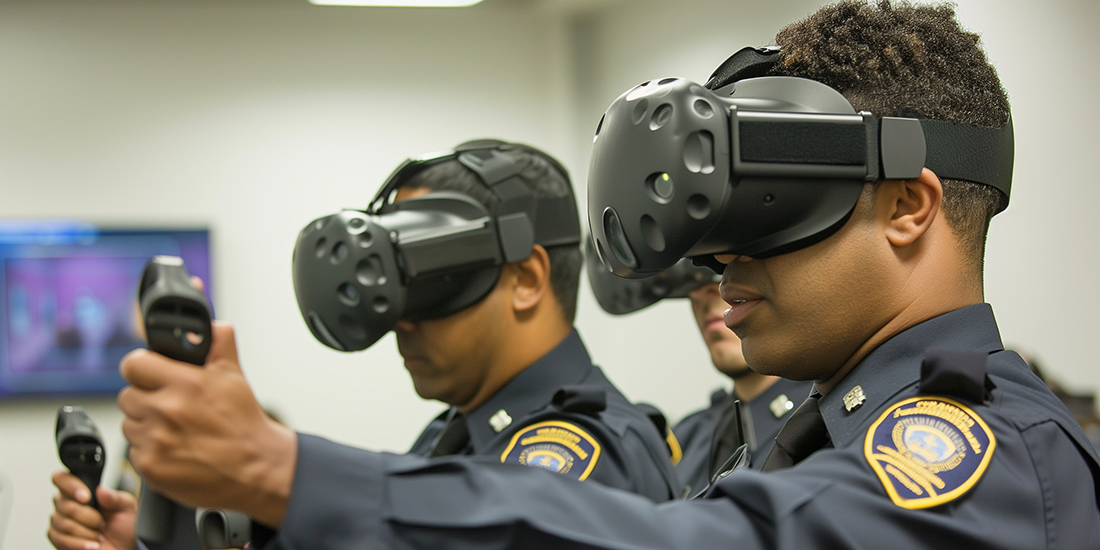As guardians of the public trust, empowered with constitutional privileges, law enforcement officers are held to a higher standard by society. As such, raising national training standards for law enforcement is imperative. The standards that the industry sets ensures that all law enforcement officers receive the same consistent level of knowledge and skills necessary to perform their jobs safely and effectively. Training standards lead to improved quality of work, increased consistency across an organization and the policing community at large, and risk reduction associated with insufficient training. Quality training establishes a standard for competency among state, local, and tribal law enforcement agencies, potentially extending to certain participating federal departments, thereby encompassing the entire law enforcement community.
The Peace Officer Standards and Training Program
The Peace Officer Standards and Training Program (P.O.S.T.) is a state-level monitoring and regulatory program that licenses law enforcement, ensures compliance with continuing education requirements, and conducts investigations into officers’ actions that threaten their license. The key role of P.O.S.T. is to establish “minimum” standards for the selection and training of law enforcement officers on a state-by-state basis. California was the first state to create a P.O.S.T. commission in 1959, laying the foundation for standards of similar bodies in other states. Currently, all 50 states have their own unique version of P.O.S.T. commissions. However, their specific training standards can differ depending on the jurisdiction. For example, law enforcement agencies in cities like New York City and Chicago are certified by the Commission on Accreditation for Law Enforcement Agencies and may send their officers to P.O.S.T. training but will not require P.O.S.T. certification hours as in-service training. These agencies will often conduct in-house contracted training for certification or utilize a “train the trainer” framework to instruct others within the agency, which may reduce training costs.
Lowered Standards
Law enforcement is an evolving field, especially when it comes to technology, policies, the law, and emerging threats. In recent years, law enforcement agencies have been struggling to recruit qualified officers, and agencies have lowered standards to fill vacancies. Due to this current recruitment phenomenon, retaining and training officers currently in the workforce is even more necessary. Training continually provides law enforcement personnel with essential skills, current knowledge, and confidence to handle situations ranging from routine officer patrols to new, high-risk emergencies. Training furthermore ensures public safety by empowering law enforcement to make knowledgeable decisions, manage stress, and respond appropriately while upholding the highest ethical standards. A proficient and well-trained law enforcement agency builds trust within the communities they serve, and they are better prepared to more effectively navigate complex landscapes with professionalism and competence.
Standardized Training
P.O.S.T. establishes a standardized level of knowledge, skills, and ethical conduct for law enforcement officers across a jurisdiction. It additionally guarantees public safety by assuring that all officers meet minimum competency requirements, which can reduce excessive force, promote community trust, introduce new technology, teach about emerging threats, and support the constitutional rights of the community by providing consistent guidelines for police conduct.
One major challenge in managing a law enforcement agency is finding sufficient budget to meet the growing number of police officer training needs. Funding is available from a variety of sources, both private and public, that offer training to local, state, and tribal law enforcement. States also offer funding mechanisms for police training, such as those offered through the Tennessee Office of Criminal Justice Programs, which manages state and federal funds. The program oversees hundreds of grants to various departments at state and local levels and to nonprofit agencies for criminal justice and victim services needs. Additionally, there are several free police training resources, including nonprofits, the COPS Office Training Portal, the FBI’s Virtual Academy, and the United States Deputy Sheriff’s Association.
The overall efficacy of the P.O.S.T. program is viewed positively among practitioners who perceive the training as raising the standard aptitude of law enforcement officers. Nonetheless, P.O.S.T. effectiveness can vary depending on program quality, reliable enforcement of standards, and necessary training updates. Standards vary by state, such as minimum hours required for basic training, educational requirements, and firearms training. A recent study demonstrated that training requirements in the U.S. are inconsistent and “woefully inadequate,” based on national and international comparisons. The Violent Crime Control and Law Enforcement Act of 1994 allocated authority to the Department of Justice to evaluate law enforcement agency procedures that purportedly violate people’s federal rights. In the past 30 years, the department has investigated over 60 law enforcement agencies, finding that there was inadequate training in place at each agency.
Despite the adoption of P.O.S.T., individual state commissions have their own criteria and processes for awarding continuing education credit. Some jurisdictions conduct a comprehensive evaluation of the curriculum, but others require no review at all. As a result of this inconsistency, officers receive training of varying degrees of quality across the U.S. Poor or outdated programs expose officers to a host of serious problems, including litigation and injury. In 2015, the International Association of Directors of Law Enforcement Standards and Training worked in partnership with several state P.O.S.T. commissions across the U.S. to create the National Certification Program (NCP). The association’s accreditation process ensures that training programs meet international standards and national requirements. The NCP instituted national certification specifications for all criminal justice training, both online and in person. NCP created specifications to meet or exceed current state requirements and ensure that training would be accepted by every participating P.O.S.T. commission. 36 states have since adopted the program.
By having a national standardized requirement to routinely analyze training programs, P.O.S.T. commissions can set a high bar for training development, content, support, and delivery. By employing subject matter experts and curriculum development specialists who have extensive experience in law enforcement, they can ensure the curriculum is up to date, vetted, and standard across jurisdictions.
In most states, police officers must earn 20 to 40 hours of P.O.S.T. credits yearly, depending on specific jurisdiction and agency requirements—the national average of in-service training hours is only 21. Given the complexity and evolution of today’s law enforcement officer, the required continuing education hours are bare minimum. Many experts argue that the current annual training requirements for law enforcement officers are largely considered too low and advocate for significantly more frequent and comprehensive training sessions to address growing situations, community needs, and best practices in law enforcement. According to a recent report from Police Executive Research Forum, standards for training at agencies in the U.S. are inconsistent and mostly out of date.
Creating appropriate training while maintaining P.O.S.T. standards starts with a course design that is pertinent to the duties of an officer. Whether the training is for a patrol officer, student resource officer, or investigator, specialized training must still meet standards that emphasize officer and public safety.
The Advantage of “Pracademic” Instruction
Overall, a successful model for instruction includes elements like clear learning objectives, active student engagement, differentiated instruction, formative assessment, modeling, and collaborative learning. A best-practice model for law enforcement instruction would include active learning models and scenario-based training, which is the current model adapted and frequently utilized through the P.O.S.T.-approved training at the University of Tennessee Law Enforcement Innovation Center (LEIC), which operates as a branch of the University of Tennessee Institute for Public Service. LEIC receives funding from the Tennessee Office of Criminal Justice Programs and other sources and has created a unique training model.
One aspect of LEIC’s training is the role of “pracademics” in their P.O.S.T. program. Pracademics in law enforcement are individuals with advanced academic training and institutional law enforcement expertise. They apply their experience in practice and academics to improve their teaching and research. In a report from the Police Executive Research Forum, one overarching takeaway was not only how the training was delivered but by whom. Law enforcement training programs have long used practitioners to help develop training materials, teach courses, and provide real-world experience. However, offering a more blended approach to training models by utilizing academics in training better incorporates scholarly knowledge and research. This provides officers a deeper understanding of societal issues, criminal behavior patterns, and effective de-escalation techniques, beyond just procedural training, and leads to more informed and nuanced policing practices.
Law enforcement management may be more accepting of research, theory, and data than the frontline practitioner, who may value “on-the-job” observations over theory. Likewise, criminology and criminal justice faculty may be more comfortable with theory to the exclusion of practitioner viewpoints. This disconnect in trust on either side can have consequences in educating and training professionals and students alike. The experiences of a practitioner who has transitioned into training can bring a unique and trusted perspective but can also be the conduit for academic theory in practical law enforcement.
LEIC is committed to public service and bridged that gap by combining university education and research into training through pracademic P.O.S.T.-certified training. The LEIC model utilizes pracademic instructors that have developed P.O.S.T.-certified training courses that are up to date, real-world, theoretical, standardized and available to local, state, and federal law enforcement agencies. These courses are post-academy training that provide insight into new crime trends that may not yet be a concern to local jurisdictions. LEIC instructors utilize research, data, theory, collaboration, and intelligence-gathering to enhance awareness of latest trends in criminality to support officer knowledge and safety. This practice has advanced not only P.O.S.T. training but also law enforcement professionals’ interests in higher education not otherwise pursued.
The LEIC partnership with pracademics can be a national training model for not just law enforcement, but also other first responders and criminal justice professionals. For example, pracademics in university-level nursing programs can offer valuable medical training to first responders that could attract students to the training, exposing them to practitioners and their experiences. Medical professionals rely on medical theory to diagnose and treat patients, but their practice also informs the development of new theories through clinical observation and research theory.
Bridging the gap between theory and practice brings several benefits to law enforcement training:
- Clarifies “root causes” of crime to better inform policing strategies by learning about theories like social disorganization, strain theory, and broken windows theory
- Provides a thorough understanding of legal statutes, constitutional rights, and proper procedures to prevent legal violations
- Introduces the behavioral science behind de-escalation methods, crisis intervention, and human behavior in traumatic settings
- Creates understanding of cultural and social contexts of different communities to build better police-community relationships
- Teaches officers how to interpret crime data and identify crime patterns
Theory, Practice, and High Standards
While there is consensus about the importance of standardized training, there is limited empirical research on the long-term impact of P.O.S.T. programs on police officer performance and community safety. In order to maintain the highest standards of training, curricula should be continually evaluated based on outcomes. Collaboration with academic institutions to develop specialized training programs can enhance the P.O.S.T. program, and if pracademics are integrated into training, their research skills can contribute to ongoing improvement and relevance.
Overall, P.O.S.T. programs, like those established through organizations like LEIC, play a vital role in launching a “beyond the minimum level of competency” standard for law enforcement officers. However, there are gaps in training content due to dated material, new technologies, or emerging threats. Pracademics can analyze real-life scenarios and apply academic concepts for practical training.
Consistently enforcing national standards and continuously evaluating the effectiveness of training programs are vital as we strive to keep law enforcement professionals on pace with the shifting paradigm of policing. Ensuring that academic knowledge is translated into practical skills relevant to real-world policing scenarios can be critical as pracademics balance theory and practice. As the landscape for law enforcement training evolves, it is crucial to understand that theory and practice are inextricably linked. Theoretical insights are fundamentally intertwined with “real-world” experience. Both are essential to empower professionals in law enforcement to serve the community to the best of their ability and to protect themselves and their community from harm.
LEIC training has expanded its scope of educating law enforcement with an innovative teaching model incorporating pracademics. By creating P.O.S.T.-certified courses with seasoned pracademics, LEIC has merged academia and training into a robust program that crosses institutional boundaries. This approach to developing training can be applied to other first-responder training, which will enrich teaching with an experiential learning model, creating a new national standard.

Richard Schoeberl
Richard Schoeberl, Ph.D., has over 30 years of law enforcement experience, including the Federal Bureau of Investigation (FBI) and the National Counterterrorism Center (NCTC). He has served in a variety of positions throughout his career, ranging from a supervisory special agent at the FBI’s headquarters in Washington, D.C., to unit chief of the International Terrorism Operations Section at the NCTC’s headquarters in Langley, Virginia. Before these organizations, he worked as a special agent investigating violent crime, human trafficking, international terrorism, and organized crime. Additionally, he has authored numerous scholarly articles, serves as a peer mentor with the Police Executive Research Forum, is currently the chair of the criminal justice and homeland security graduate and undergraduate programs at the University of Tennessee Southern, and works with Hope for Justice—a global nonprofit combating human trafficking. He has served as an advisor withDomestic Preparedness Journalfor two decades.
- Richard Schoeberlhttps://www.domesticpreparedness.com/author/richard-schoeberl
- Richard Schoeberlhttps://www.domesticpreparedness.com/author/richard-schoeberl
- Richard Schoeberlhttps://www.domesticpreparedness.com/author/richard-schoeberl
- Richard Schoeberlhttps://www.domesticpreparedness.com/author/richard-schoeberl

Anthony (Tony) Mottola
Anthony (Tony) Mottola, Ph.D., has over 35 years of law enforcement and security experience, including the New York City Police Department, United States Air Force, and the National Basketball Association. He retired as a sergeant detective after 25 years as a member of the New York Police Department (NYPD). He served as executive officer for the NYPD Intelligence Bureau’s Strategic Unit, which is a covert counterterrorism initiative, and director of the Domestic Liaison Program. He represented the Intelligence Bureau in numerous investigations, including the Boston Bombing, civil unrest, mass shootings, and large-scale incidents outside New York City. During his tenure with NYPD, he worked additional assignments in Counterterrorism, Gang Intelligence, Detective Bureau, Task Force, Street Narcotics Enforcement Unit, anti-gang/graffiti units, and patrol. He was a first responder/search leader for recovery efforts and supervisor of security details in the immediate aftermath of the World Trade Center attacks. He is currently an assistant professor of criminal justice and homeland security at the University of Tennessee Southern.
- Anthony (Tony) Mottolahttps://www.domesticpreparedness.com/author/anthony-tony-mottola
- Anthony (Tony) Mottolahttps://www.domesticpreparedness.com/author/anthony-tony-mottola
- Anthony (Tony) Mottolahttps://www.domesticpreparedness.com/author/anthony-tony-mottola
- Anthony (Tony) Mottolahttps://www.domesticpreparedness.com/author/anthony-tony-mottola






